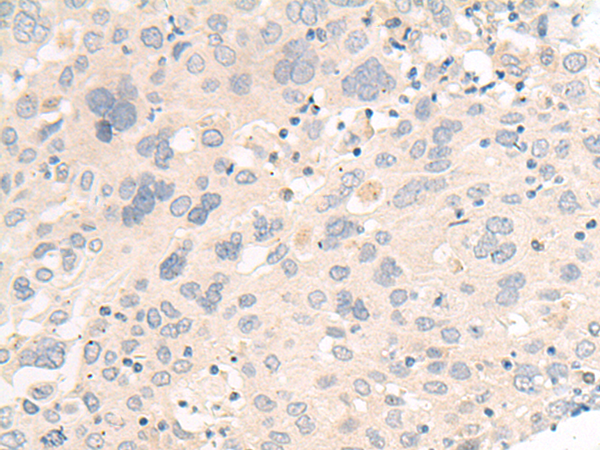
| WB | 咨询技术 | Human,Mouse,Rat |
| IF | 咨询技术 | Human,Mouse,Rat |
| IHC | 1/20-1/100 | Human,Mouse,Rat |
| ICC | 技术咨询 | Human,Mouse,Rat |
| FCM | 咨询技术 | Human,Mouse,Rat |
| Elisa | 1/5000-1/10000 | Human,Mouse,Rat |
| Aliases | FHOS |
| Host/Isotype | Rabbit IgG |
| Antibody Type | Primary antibody |
| Storage | Store at 4°C short term. Aliquot and store at -20°C long term. Avoid freeze/thaw cycles. |
| Species Reactivity | Human, Mouse |
| Immunogen | Synthetic peptide of human FHOD1 |
| Formulation | Purified antibody in PBS with 0.05% sodium azide and 50% glycerol. |
+ +
以下是关于FHOD1抗体的3篇参考文献的简要信息:
1. **文献名称**:*"FHOD1 regulates actomyosin assembly and sarcomere organization in striated muscles"*
**作者**:Taniguchi et al.
**摘要**:该研究利用FHOD1抗体进行免疫荧光分析,发现FHOD1在横纹肌细胞中调控肌动蛋白-肌球蛋白组装,维持肌节结构,并揭示其缺失导致肌肉收缩功能障碍。
2. **文献名称**:*"The formin FHOD1 promotes vascular smooth muscle cell plasticity in atherosclerosis"*
**作者**:Stastna et al.
**摘要**:通过FHOD1抗体检测,研究显示FHOD1在动脉粥样硬化中促进血管平滑肌细胞表型转化,增强迁移能力,提示其参与病理血管重塑过程。
3. **文献名称**:*"FHOD1 interacts with Rac1 and Src to regulate invadopodia formation in breast cancer cells"*
**作者**:Lizarraga et al.
**摘要**:该研究结合FHOD1抗体的免疫印迹和共聚焦成像,证实FHOD1通过Rac1/Src信号通路调控乳腺癌细胞侵袭伪足形成,影响肿瘤转移能力。
以上文献均通过FHOD1抗体开展蛋白定位或表达分析,涵盖肌肉功能、心血管疾病及癌症领域的研究。
FHOD1 (Formin Homology Domain-containing protein 1) is a member of the formin family of actin-nucleating proteins that regulate cytoskeletal dynamics by promoting actin filament assembly. It plays critical roles in cell migration, adhesion, and morphogenesis through its conserved FH1 and FH2 domains, which mediate interactions with actin and other cytoskeletal regulators. FHOD1 is distinct from other formins due to its unique N-terminal extension and autoinhibitory mechanism, which modulates its activation in response to Rho GTPase signaling, particularly RhoC.
Antibodies targeting FHOD1 are essential tools for studying its expression, localization, and function in cellular processes. They are widely used in techniques like Western blotting, immunofluorescence, and immunoprecipitation to investigate FHOD1's involvement in physiological and pathological contexts, including cancer metastasis, cardiovascular development, and immune cell regulation. Commercial FHOD1 antibodies are typically raised against specific epitopes, such as the C-terminal region, and validated for species reactivity (e.g., human, mouse, rat). Researchers must verify antibody specificity due to potential cross-reactivity with homologous proteins like FHOD3. Recent studies using FHOD1 antibodies have highlighted its role in invadopodia formation in invasive cancers and its interaction with stress fiber components, reinforcing its importance in cell motility and disease mechanisms.
×